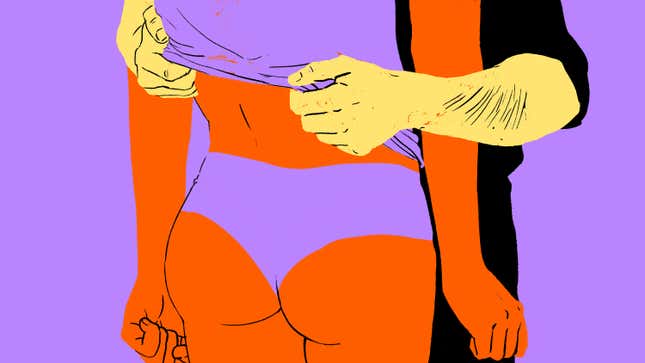The Convenient Lie of 'Sexual Empowerment'
Latest
Illustration: Angelica Alzona
This is an adapted excerpt from Tracy Clark-Flory’s Want Me: A Sex Writer’s Journey into the Heart of Desire, a memoir about coming of age under the illusion of sexual freedom.
I was sitting on a weathered wooden bench next to Brian (“or was it Ryan?!?” I later wrote in my journal). We were sharing a bottle of rum that he’d stolen from a convenience store of a mega hotel with a thundering waterfall in its lobby. I was a high school sophomore on a Hawaiian vacation with my parents—and I’d been invited by some boys to a party on the beach. Brian and I swigged while staring out at the white sand, where a dozen or so other kids similarly swigged. Nearby, a girl around my age wearing a strappy tank top and short shorts was yelling while falling into some bushes of beach cabbage. The thick mass of waxy green leaves and bursting white flowers cushioned her tiny body before she bounced right back and then promptly fell again.
Her words were slurred by booze and muted by the falls, but I got the impression she was yelling at me. In response, Brian said, loud enough for all to hear: “Don’t pay attention to her. That’s just Trashy Ashley.” I wasn’t even sure of Brian’s name in that moment, but all these years later, I still remember “Trashy Ashley” with the crystal clarity of the neighboring pool.
Then I was throwing up into the beach cabbage. Brian, I later wrote in my journal, “was so sweet about it.” He told me I’d feel better once it was “out of my system” and walked me to a beach chair where we proceeded to make-out. “That shit was SO amazing (underlined),” I wrote of this post-vomit tongue-wrestling, my first real kiss. Then he suggested we try one of the cabanas by the pool, which had privacy curtains that could be closed completely. I’d just had my first kiss, but now came in quick succession: first fingering, first hand job, first blow job, first cunnilingus. Then, at his suggestion: first “titty fucking” and first “69.”
All the while, I kept a vigilant eye on the curtains of the cabana, knowing that any of the nearby partiers could easily peek in, noting that the rum was making the edges of my vision blur, and understanding that “bad things” could happen to girls in moments like this. Brian suggested sex and I gave a firm “no.” About this, I felt “really good,” I later wrote, obviously proud at standing up for myself. Now, this makes me wonder whether there were other acts to which I might have liked to have said “no,” and if I even knew the answer at the time.
In my journal, I concluded the Hawaii scene by writing, “He comes, yada yada yada.” Yada yada yada. As though I’d ever done that before, as though it were already old hat. I was emphatic about my own enjoyment, though: “It was fun, & I’ll be smiling & happy for the next week, non-stop (underlined),” I wrote. “It was like an AMAZING (underlined) in-my-dreams fantasy come to life.” I went on to volunteer, “I don’t feel demeaned or degraded or stupid or anything (underlined). He wasn’t taking advantage of me, I did exactly what I wanted & got exactly what I wanted, same w/him.”
It was a lot of underlined text.
A few years ago, I returned to this long-ago journal entry after a deep-dive into contemporary feminist research that mapped the shifting sexual landscape for young women. My teenage voice read just like the subjects of those papers analyzing narratives around young women’s sexual agency: the emphatic denial of victimhood, the claims of being in control, and the emphasis of getting exactly what I wanted. These were part of neoliberal feminist narratives that emerged in the nineties, alongside shouts of “girl power.”
-

-

-

-

-

-

-

-

-

-

-

-

-

-

-

-

-

-

-

-

-

-

-

-

-

-

-

-

-

-

-

-

-

-

-

-

-

-

-

-








































